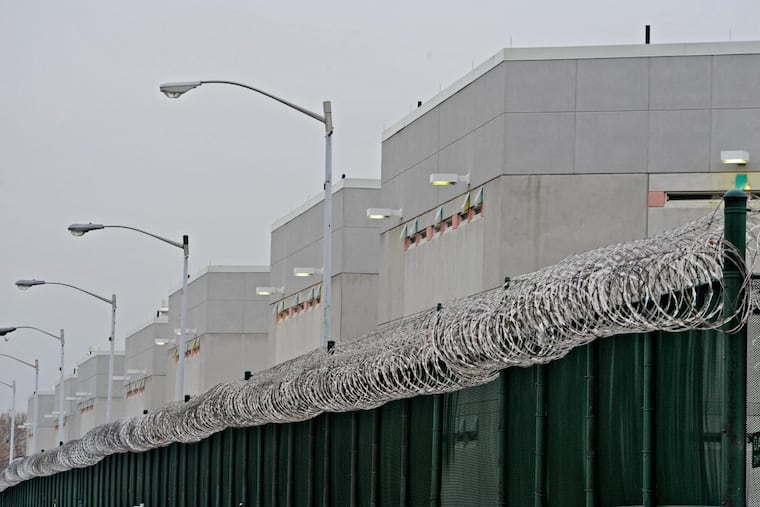Appalling conditions in city jails persist. Mayor Parker must focus on a solution. | Editorial
People continue to needlessly die and get injured on the city’s watch.

Turns out one of the worst repeat offenders inside the Philadelphia jails is the city itself.
Four years ago, attorneys filed a federal class-action lawsuit alleging unconstitutional and inhumane conditions inside the city jails, which were exacerbated by the pandemic.
In 2022, as part of a settlement, the city agreed to an independent monitor and pledged to rectify staffing shortages that have resulted in prolonged lockdowns and heightened violence inside the jails.
But the problems have persisted.
A federal judge recently found the City of Philadelphia in contempt and ordered it to pay $25 million into a fund to address the staffing shortages. U.S. District Judge Gerald A. McHugh required the city to ramp up staffing, which is 45% below what is needed to adequately operate the jails.
The staffing shortages have resulted in guards sometimes working beyond their regular 12-hour shifts and falling asleep on the job, while incarcerated people have been frequently locked in their cells for days on end. Drugs and other contraband flow freely, leading to overdoses, escapes, and stabbings.
Jails are meant to rehabilitate people, not kill or harm them. Yet, the city has managed to make already troubled lives even worse.
More than two dozen people have died from drug-related causes inside city jails since 2018, The Inquirer reported.
Correctional officers have been taken for medical treatment twice in recent weeks after becoming dazed from thick smoke from the synthetic drug K2. Four incarcerated people were rushed to hospitals after being injured in fights.
The disorder, drugs, and violence inside the jails echo some of the worst conditions of life on the streets.
David Rudovsky, one of the lawyers representing the plaintiffs, said the prisoners have endured “horrendous” and unconstitutional conditions. Even worse, roughly 90% of the people inside the city jails are awaiting trial and have not had their day in court.
So some may be innocent or even falsely charged. Even for those who are convicted, the inhumane conditions amount to cruel and unusual punishment.
Clearly, the city jails need fixing.
» READ MORE: Philadelphia’s prisons are in crisis. Mayor and Council need to act. | Editorial
Shame on former Mayor Jim Kenney and City Council for largely ignoring the problem during his do-nothing tenure. The good news is Blanche Carney — who Kenney appointed and who presided over the beleaguered jails for eight ineffective years — retired in March.
The following month, Mayor Cherelle L. Parker, who took office in January, appointed Michael Resnick to head the Department of Prisons.
Resnick is a longtime city official who served as the acting prisons commissioner in 2015 and was the commissioner of pretrial detention and services in Maryland’s Department of Public Safety and Correctional Services.
The head of the union that represents correctional officers called Resnick’s hiring a breath of fresh air after the union voted “no confidence” in Carney.
The change in leadership was a much-needed first step. A spokesman said Parker cares “deeply” about the situation in the prisons.
However, the mayor’s first budget proposed essentially flat funding for the jails, and Resnick said it could take two to three years to get staffing back to a “comfortable” level.
To be sure, the staffing shortage is not unique to Philadelphia. Prisons across the country have struggled to recruit and retain staff since the pandemic.
Staffing shortages have also plagued the Philadelphia District Attorney’s Office as well as the public defenders, causing backlogs in the city courts and extending the jail stays for those awaiting trial.
The delays amount to justice denied, as many of the roughly 4,700 prisoners behind bars endure cruel conditions for months while awaiting a court date.
Many of those detained are Black and brown people who continue to be overrepresented at every stage of the criminal justice system. Detaining people in unsafe conditions reduces opportunities to turn their lives around.
» READ MORE: Philly jails are in crisis, and a tactic used during COVID-19 is the solution | Editorial
The city jails are not the only correctional institutions facing trouble. Scores of teens held in 10 juvenile detention centers across the state have alleged in lawsuits that they were raped, molested, or beaten by staffers. The lawsuits echo problems that have plagued juvenile detention centers in Pennsylvania for decades, compounding issues facing troubled young people.
The state’s abuse of troubled youngsters is unconscionable and cries out for full accountability. Gov. Josh Shapiro would be wise to order an independent investigation of the disturbing allegations at the juvenile detention centers.
More broadly, the mass incarceration, abuse, and lack of rehabilitation inside prisons, jails, and juvenile detention centers impact extended families and cost taxpayers billions nationwide — whether they interact with the legal system or not.
Philadelphia’s prolonged failure to address the disgraceful conditions inside its jails is appalling because it has been allowed to fester. People continue to needlessly die and get injured on the city’s watch.
Parker inherited the jail problem, but now it is essential that she ensure it gets fixed.